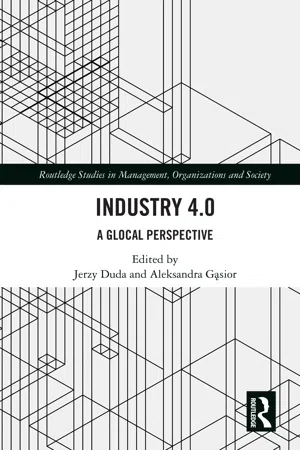
Industry 4.0
A Glocal Perspective
Jerzy Duda,Aleksandra G?sior
- 240 páginas
- English
- ePUB (apto para móviles)
- Disponible en iOS y Android
Industry 4.0
A Glocal Perspective
Jerzy Duda,Aleksandra G?sior
Información del libro
The Fourth Industrial Revolution, also known as Industry 4.0, refers to the industrial paradigm bringing together the digital and physical worlds through the cyber-physical Systems, enhanced by the Internet of Things aimed to increase the effectiveness of human-machine cooperation (HMC). This book deals with issues related to the challenges of Industry 4.0 that are faced by enterprises and universities. Contrary to most publications on the subject, it covers both technological and business aspects of these challenges and shows how strong they are intertwined, bringing new value to readers. The book also presents new findings that will guide enterprises through Industry 4.0.
This book offers readers an in-depth discussion of important areas of enterprises' activities in the context of Industry 4.0. The first area concerns human resources management; in particular, what new employee competencies will be needed on the labor market, how to use modern concepts (e.g. design thinking), and how to manage multi-national teams of employees. The second area is related to marketing and covers issues regarding customized products. The third area is devoted to technical aspects such as autonomous vehicles, Internet of Things (IoT), radio-frequency identification (RFID) systems, and Bluetooth Low Energy (BLE) technology. The fourth area concerns IT systems, including systems that support work and business management, strategic information systems, and cyber-physical systems.
Aimed at researchers, academics, practitioners, and students, it will be of value to those in the fields of human resource management, marketing, organizational studies, and management of technology and innovation.
Preguntas frecuentes
Información
1 Evolution of Organization Management in Light of Economy 4.0 Challenges
Introduction
Characteristics of Economy 4.0 in Poland
Índice
- Cover
- Half Title
- Series
- Title
- Copyright
- Contents
- List of Tables
- List of Figures
- List of Contributors
- Preface
- 1 Evolution of Organization Management in Light of Economy 4.0 Challenges
- 2 Challenges in Production Management in Context of Industry 4.0
- 3 Challenges of Business Model Concept of Small- and Medium-Sized Enterprise Cooperation
- 4 Challenges of Industry 4.0 Development From Perspective of Supplier of Automating Production Process Solutions
- 5 Strategic Information Analytics System in Context of Challenges of 4.0 Age
- 6 Effect of Integrated IT Systems on Enterprise Competitiveness at Time of “Industry 4.0”
- 7 EFQM RADAR-Based Assessment of RFID System as Part of Industry 4.0 Implementation—A Case Study of a Production Plant
- 8 Internet of Things as One of Industry 4.0’s Trends—Chosen Theoretical and Empirical Aspects
- 9 Cyber-Physical Logistics Platform—Toward Digitalization of Printing Company
- 10 Autonomous Vehicles as Part of Industry 4.0 Concept
- 11 Modern Marketing for Customized Products Under Conditions of Fourth Industrial Revolution
- 12 Needs of Competency in Industrial Enterprises in Industry 4.0 Development Perspective
- 13 Design Thinking for Industry 4.0 Career Design—How to Increase Professional Development Awareness for Future Enterprises’ Human Resources
- 14 Challenges and Problems in Managing Multigenerational Team in Era of Industry 4.0
- 15 Progress in Implementation of Fourth and Fifth Industrial Revolutions and Artificial Intelligence
- Index